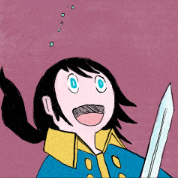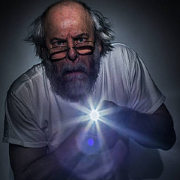|
I can't remember, did anyone other than Spock ever use Khan's full name? Harrison called himself Khan, but what if it's all bullshit? What if Khan is a title rather than a name for the Augments? What if Khan Noonien Singh was peacefully sleeping in one of those crytubes the whole time, or is loose in the Federation hatching a big 'ol plot?
|
|
|
|

|
| # ? May 2, 2024 06:10 |
|
The reason the Khan in WOK is different than the series is because after playing Fantasy Island for so long, Montalban had real problems playing someone else. He had to watch the show again and rediscover the character. Can you really call it a retcon when it was not the intent?
|
|
|
|
Riso posted:Can you really call it a retcon when it was not the intent? Yes, although 'retcon' is not really the best word for it. Meyer's change bypasses issues of canonicity entirely, by simply not giving a poo poo about canon.
|
|
|
|
Riso posted:Except WOK is neither the first nor the only appearance of the character. WoK is, however, far more influential when it comes to depicting the character. How many people in the other Trek thread have said that they've watched a lot of Trek, but never watched TOS?
|
|
|
|
SuperMechagodzilla posted:This is another example of tropes being identified, in place of more nuanced analysis. There is a clear difference between how Kirk treats women in the beginning of the film, and how he treats Carol, who chastises him and demands that he respect women. There's a power dynamic being expressed in that scene, and it's not one that Kirk is on the upper side of. Carol's inclusion as a new part of the crew is the biggest sign that this new 'five year mission' will be very different from the previous one. Imagine the original series with significantly less alien-loving. Here are some people that wrote lots more about such a film than I can be bothered. I pretty much agree with most of what these guys said about it. They capture more why it's a bad Trek film, beyond just if it's a decent action flick (which you could say about almost anything these days): http://www.breitbart.com/InstaBlog/2013/05/24/Star-Trek-Into-Darkness-review http://www.themarysue.com/star-trek-into-darkness-review/
|
|
|
|
I agree with those in the thread who feel that whitewashing is a serious problem in film casting that is getting worse at the moment but one thing I feel hasn't been necessarily addressed enough is how Star Trek and its genre relatives have contributed to really static and wrongfully scientific ideas of "race" (which doesn't exist) and ethnicity, which was a concept intended to be very obviously socially constructed but has become another by-word for biological race. Obviously, in Trek (and Trek-inspired series), cultural and ethnic diversity was supposed to be celebrated by analogy with cooperation between different species, and biological species in the series are also homogenous cultures. This obviously reflects earlier anthropological 20th century ideas about difference and cultural diversity (and with it, earlier, more racially problematic ideas about post-capitalist, post-scarcity utopia), but I'm wondering whether the continuation of this trend in Trek hasn't been one of the whole series' greatest crimes. The obsession with phenotype also seems to rely on an ugly essentialism that eventually ends up in people's insistence on Othello being as dark-skinned as possible, or people complaining that Denzel was too dark to play Malcolm X. That being said, I think Cumberbatch was brilliant as Khan, and that the invisible whiteness of Khan was brilliantly written. If there was ever a people who considered themselves automatically and without any further comment racially superior and entitled to genocide, it's the English, and they've always accomplished it unacknowledged and with invisibility. STID's Khan was to my mind perfect in how his villainnous-ness was always implicit and normalised: there wasn't really any formal exposition scene detailing his criminality, for example and his interaction with Kirk is at times no more antagonistic than bickering bromance (the scene where they wait in the airlock). He even kills Kirk completely indirectly, unknowingly and with virtually no individual malice. Many people of colour can certainly attest to being familiar with that in their encounter with the English and their settler descendants. He's one of the best white villains I've ever seen. I even like the way he sees himself as the victim, which is certainly how white supremacy is working in the anglophone world right now. Great Enoch fucked around with this message at 18:07 on May 26, 2013 |
|
|
|
Tony Montana posted:I thought it was a bad film, I did not like it. A lot of those complaints in that first review are nitpicks based on wrong assumptions and inattentiveness. For example, in Star Trek its often easier to beam someone down than up since beaming someone up requires getting a lock on their exact location, which may be constantly moving or subject to interference, but when beaming someone down they already have the subject in a stable position and they just need to pick the right place to put them. Also, the "rented thugs" the article mentions are Section 31, who are already a part of past Trek series, and I don't see why building a warship would be outside of their capabilities. The second review has a very un-nuanced view of the film's themes, in wanting to divide the characters into clear-cut "good guy" and "bad guy" roles when the film can be seen as calling both into question. Again, this is not new to the Trek franchise since the same theme is explored in DS9, even with a similar plot-line at one point. quote:I agree with those in the thread who feel that whitewashing is a serious problem in film casting that is getting worse at the moment but one thing I feel hasn't been necessarily addressed enough is how Star Trek and its genre relatives have contributed to really static and wrongfully scientific ideas of "race" (which doesn't exist) and ethnicity, which was a concept intended to be very obviously socially constructed but has become another by-word for biological race. Obviously, in Trek (and Trek-inspired series), cultural and ethnic diversity was supposed to be celebrated by analogy with cooperation between different species, and biological species in the series are also homogenous cultures. This obviously reflects earlier anthropological 20th century ideas about difference and cultural diversity (and with it, earlier, more racially problematic ideas about post-capitalist, post-scarcity utopia), but I'm wondering whether the continuation of this trend in Trek hasn't been one of the whole series' greatest crimes. The obsession with phenotype also seems to rely on an ugly essentialism that eventually ends up in people's insistence on Othello being as dark-skinned as possible, or people complaining that Denzel was too dark to play Malcolm X. That whole thing (especially the assumed homogeneity of different space races) was also tackled quite well by DS9. Time and time again the Starfleet crew assumes they can look at someone's race/species and know everything about them, and each time they get egg on their faces. Lord Krangdar fucked around with this message at 18:22 on May 26, 2013 |
|
|
|
Tony Montana posted:I pretty much agree with most of what these guys said about it. John Hayward posted:You know what would have convinced me to arm my "explorers" to the teeth, beyond the simple common sense that they need protection against the unknown menaces of deep space? A hyper-advanced Romulan warship popping back from a century in the future and blowing the entire Starfleet to pieces. Did the people who wrote "Into Darkness" not remember the plot of its 2009 predecessor? Why would anyone in the galaxy need further convincing that strong defenses are necessary? (And why doesn't the Earth seem to have any orbital defenses at all, even after the aforementioned time-travelling Romulan ship almost destroyed it a few years previously?) Who needs to provoke a war with the Klingons when you can just point at the big hole Captain Nero blew in the bottom of the San Francisco bay, right next to Starfleet headquarters? This guy doesn't understand that the super-stealth cruise missiles have no use as defensive weapons. Scotty is obviously not objecting to there being weapons on the Enterprise, but to there being volatile experimental superweapons designed to violate international law. He is also, more specifically, objecting to the Enterprise being comandeered by the Federation as a tool for the direct exercise of state power. This guy's logic is seriously "So what if we do develop this Solanite bomb? We'd be even a stronger nation than now." He considers Scotty's conscientious objection to deploying the Solanite bomb a plot hole. At the same time, the dude doesn't seem to get that Marcus' goal is not actually the defense of earth but sparking a culture-war against the space-muslims who resist assimilation into the Federation (which, the film makes clear, is pretty much the 'western' world of today except with flying cars). It's literally a premptive strike doctrine. And then he goes on to say that the film doesn't challenge the Federation's ideology in any way.
|
|
|
|
MisterBibs posted:Yeah, no. That's pretty silly. There's no such thing as ethnic neutrality, though, unless you're willing to buy into whiteness as default, which itself is loaded with racist poo poo. By saying "he doesn't look Mexican" you are relying on a coded "real Mexican" that is inaccurate and asinine. Looking white isn't looking neutral. I am neither upset nor surprised at people who don't give a poo poo about the marginalization of people of color in film and television - I do, however, find myself surprised and irked by the number of people willing to go to bat for it. SuperMechagodzilla posted:I find this line of discussion uninteresting because it seems like multicultural identity politics without much concern for the broader struggle against oppression. What is the end-goal? Pretty much any just system - yes, even glorious socialist utopia or [insert your desired outcome] - is going to have to reckon with structural and cultural marginalization of people of color. This is part of that. I get that identity politics is a dirty phrase to many people, but identities are political and the goal should be to erase differentiated opportunities on the basis of race, not erase racial identities. We're so far off from that that we're still on "let color play color." Here's how it goes though: When actors of color get to play roles of color (as opposed to white people doing it), we get more actors of color in prominent positions, which creates conditions for directors of color and writers of color to get more opportunities, which allow people of color to use the medium to transmit their own stories through that medium. Basically it's a means of increasing opportunity and fighting oppression by securing spaces in the medium. Unless we're arguing that cultural marginalization somehow doesn't count, or that cultural expression isn't important. I mean, the rest of your post is basically "Well, I don't care so much because it scratched my back where it was important," which is fine but not really different from dismissing the issue because you thought Kirk and Spock were funny and compelling. Though, as a Bowie aficionado, I think you're reaching to say that we got a queer Khan or that Cumberbatch is Bowie-esque except that he is thin, white, and English. The Warszawa fucked around with this message at 19:14 on May 26, 2013 |
|
|
|
The Warszawa posted:Pretty much any just system - yes, even glorious socialist utopia or [insert your desired outcome] - is going to have to reckon with structural and cultural marginalization of people of color. This is part of that. I get that identity politics is a dirty phrase to many people, but identities are political and the goal should be to erase differentiated opportunities on the basis of race, not erase racial identities. We're so far off from that that we're still on "let color play color." Don't get me wrong; I'm not talking about that kind of 'post racial' nonsense. In fact, the film specifically attacks the superficial race-neutrality of previous Trek entries (that all races are equal, so long as they join the federation). Mere inclusiveness represents, in the film, the status quo. The Federation here is presented as very similar to the "post-racial, post-feminist" world of Starship Troopers. I totally agree that casting a Mexican dude as Khan would be a good political act, but that politics needs to be linked to the ethical concerns you dismiss as irrelevant. Inclusiveness can open up the space for genuine equality, but it can also just reinforce existing power structures. In this film, Khan is basically a clone whose genetic code, and therefore his body, is treated as intellectual property and therefore owned (by the Federation?). I've already gone over the tics that emphasize his otherness, and his ability to move fluidly between various identities that corresponds with a fundamental ambiguity in the character. The film employs class imagery instead of race imagery (in this specific instance) when it should employ both and link them, but this is way preferable to the opposite tact of being 'multicultural' while discounting questions of class conflict (that is, effectively, tokenism)
|
|
|
|
Khan wasn't a clone, though. He was genetically enhanced for the purposes of leading humanity.
|
|
|
|
He also wasn't enhanced by the Federation - the Federation is just exploiting the sins of its antecedents for its own personal gain. It's almost blatantly a narrative about racial subjugation.SuperMechagodzilla posted:Don't get me wrong; I'm not talking about that kind of 'post racial' nonsense. In fact, the film specifically attacks the superficial race-neutrality of previous Trek entries (that all races are equal, so long as they join the federation). Mere inclusiveness represents, in the film, the status quo. The Federation here is presented as very similar to the "post-racial, post-feminist" world of Starship Troopers. The correct response to "including people of color could open up space or reinforce existing structures" is to ensure that it does the former, not to reduce inclusion generally. Whitewashing Khan shouldn't be brushed off - it's not just "a good political act" to cast people of color in roles of color, it's the baseline of minimizing how much racism is in the film. The decision to cast white for Khan is also a political act, and it is a lovely one. I haven't dismissed any ethical concerns as irrelevant, but I am challenging the idea that your priorities are universal - that white people talking about class somehow trumps the need to fight marginalization of people of color, or that we can "wait our turn" while class issues get sorted. I don't think shirking race to purely focus on class (insofar as that is what the film is even doing, which I don't necessarily agree with) is necessarily a more desirable outcome than focusing on race to the exclusion of class, and I also don't see how casting a nonwhite actor to play Khan would've excluded class from anything at all. Is your contention that the "good" politics of the film outweigh the "lovely" politics? You started by dismissing the concern as "multicultural identity politics without much concern for the broader struggle against oppression," but short of storming Paramount and scalping JJ Abrams & co., appropriating the means of cultural production for the liberation and benefit of people of color is fighting oppression, and efforts to frustrate that through exclusion and overwriting should be criticized.
|
|
|
|
The Warszawa posted:The decision to cast white for Khan is also a political act, and it is a lovely one. To be fair Benicio Del Toro was cast in the role until he dropped out kind of last minute.
|
|
|
|
ApexAftermath posted:To be fair Benicio Del Toro was cast in the role until he dropped out kind of last minute. This has been brought up like, eight times, but this is not the NFL - the Rooney Rule is not the baseline. Outcomes matter. (Del Toro was still cross-casting.)
|
|
|
|
The Warszawa posted:This has been brought up like, eight times, but this is not the NFL - the Rooney Rule is not the baseline. Outcomes matter. Oh I'm sure it was more than eight times.
|
|
|
|
SuperMechagodzilla posted:A large part of this debate seems based on it being Memory Alpha canon that Khan (the objective virtual person within the Star Trek simulation-universe) is "probably a Sikh from the north of India". I would argue that canon is no more or less relevant than the current film says it is. But while Trek '09 used Nero to mock fixation upon canon, STID glorifies that same fixation. Old Spock gives the Word of God that this is the Khan of WoK and Space Seed, who is Bad News. This knowledge is given so much credit that Young Spock actually treats it as a substitute for real research and deduction. If the film were more consistent with its predecessor (and with its own opening scene), we might be given evidence that Nimoy was wrong. We might get some indication that his intervention was the sole cause of the enmity between this universe's Khan and Enterprise, and that Nimoy was therefore indirectly responsible for the massive casualties during the film's climax. But we don't get that; the Spocks come out of the situation looking prescient instead of guilty. Regardless, I'm not a fan of canon-dismissal being used as an excuse to give more minority roles to white actors. Citing the mutability of canon just strikes me as one more bit of lawyering to justify a lovely move. Of course Space Seed presented Khan as a hamfisted melange of otherness. That's been agreed upon, I think! But there was a kernel of something valuable in there, and this was an opportunity to patch up that portrayal and make it work, instead of dropping the idea altogether.
|
|
|
|
^^ I was hoping Khan would turn out to actually be a decent dude and help take the fight to Section 31, but nope plain old Khan, and if old Spock said he is a villain then he must be the villain! I enjoyed it, but the entire Khan spectacle was a disappointment since I went in blind and was hoping for Gary Mitchell instead. Please don't tell me we are going to rehash the original movies in sequential order now. Nothing else to add to this discussion other than I hope the next movie isn't The Voyage Home part 2 or some poo poo.
|
|
|
|
reagan posted:^^ I was hoping Khan would turn out to actually be a decent dude and help take the fight to Section 31, but nope plain old Khan, and if old Spock said he is a villain then he must be the villain! But that wouldn't make any sense. For better or worse, Khan detonated the bomb in London and gunned down the captains and first officers at Starfleet HQ. Khan was a bad dude.
|
|
|
|
Great_Gerbil posted:But that wouldn't make any sense. For better or worse, Khan detonated the bomb in London and gunned down the captains and first officers at Starfleet HQ. All under the assumption that Marcus had murdered his crew in the cryopods. I'm not going to say he is "not a bad dude" but it's a little more nuanced than Khan being a Bond villain.
|
|
|
|
There is also that whole kill all the genetically inferior humans thing.
|
|
|
|
Pretty much every villainous act Khan commits in the film is in reaction to being betrayed by one character or another.
|
|
|
|
Phylodox posted:Pretty much every villainous act Khan commits in the film is in reaction to being betrayed by one character or another. I was actually wondering how things would have gone down had Kirk not told Scotty to take him down. It just seems like that was a major catalyst for what happened next.
|
|
|
|
euphronius posted:There is also that whole kill all the genetically inferior humans thing. That was never his jam, though - he wasn't behind the genocides or anything, he was a "benign tyrant." It's why he gets marooned on Ceti Alpha V with his buddies in Space Seed. The London Kelvin Memorial Archive was a Section 31 base - it's not actually an act of terrorism, but a precision strike against a military target (with collateral damage), as was the attack on Starfleet Command. Khan's a bad dude, but he's not actually doing anything out of line with what Starfleet is doing. There's a much more interesting, better movie about Starfleet and Khan trying to figure out how to fit someone like him into the projected ideals of the Federation.
|
|
|
|
ApexAftermath posted:All under the assumption that Marcus had murdered his crew in the cryopods. I'm not going to say he is "not a bad dude" but it's a little more nuanced than Khan being a Bond villain. Also in "past earth" hadn't he been busy committing genocide against none uplifted humans anyway? It's hardly as if he'd been a decent but war like guy beforehand. I enjoyed the film, as someone who wouldn't know Khan from Adam it was good fun and very good at keeping up suspense against certain set pieces. I also liked Khan cracking the admirals skull like an egg, that was worryingly brutal and terrifying. Wish he had been of a more "accurate" lineage now that that has been pointed out, but nevertheless I thought it was very good. Also I didn't know that mister Monteblan was Mexican! You learn something new every day!
|
|
|
|
The Warszawa posted:The London Kelvin Memorial Archive was a Section 31 base - it's not actually an act of terrorism, but a precision strike against a military target (with collateral damage), as was the attack on Starfleet Command. Thats not exactly black and white.
|
|
|
|
The way I was counting it in my head watching while watching the movie: 1. Bombing London: ambiguous given the military nature of the target. 2. San Francisco attack: same 3. Killing a bunch of Klingons: Ambiguous. It was maybe in self defense, but the humans were the aggressors there. Up to this point, in my head Khan's evilness is up in the air, especially when he agrees to help Kirk. 4. Takes over bridge of the Vengeance: Ambiguous again, as it was KIrk who "shot first", but he does go a little overboard with the head smushing and knee breaking. The needle is pointing towards evil. I think at this point future Spock also gives us his caveat re Khan and it is discussed how he is planning to genocide genetically inferior humans. 5. Opens fire on Enterprise: Again! ambiguous as it was likely the Enterprise was out to get him, which turned out to be true. (although he was giving off many SMG's tics here) 6. Crashes into San Francisco: The most evil of his acts, at the end of the movie. euphronius fucked around with this message at 23:27 on May 26, 2013 |
|
|
|
The Warszawa posted:
Plenty of acts of terror have been committed against military targets. Although like you said, the only difference between him and the Federation is that one is a recognized sovereign entity, and one isn't. Which ties back into Bush logic about enemy combatants/etc.
|
|
|
|
I would argue that the reason the Beirut bombings are considered acts of terror has a lot more to do with who did them than what the target was. (The term terrorism has been selectively applied by popular media outside of its definition in political science and international relations scholarship. There's a distinction between attacks to cause terror and attacks to impair military capabilities.) computer parts posted:Plenty of acts of terror have been committed against military targets. Plenty of things that are called acts of terror by people with an interest in portraying actions by certain groups as terrorism. Whether those acts are actually examples of terrorism is definitely debatable. The distinction between state and non-state actors in terms of "lawful" action goes way beyond Bush logic, though, it's one of the elemental political and theoretical challenges of the post-World War II world at the absolute latest. The Warszawa fucked around with this message at 23:12 on May 26, 2013 |
|
|
|
SuperMechagodzilla posted:This guy doesn't understand that the super-stealth cruise missiles have no use as defensive weapons. Scotty is obviously not objecting to there being weapons on the Enterprise, but to there being volatile experimental superweapons designed to violate international law. He is also, more specifically, objecting to the Enterprise being comandeered by the Federation as a tool for the direct exercise of state power. You seem surprised that a movie review on breitbart.com seems to miss, overlook, crap on, or gloss over anything that might be considered a left-wing ideal.
|
|
|
|
euphronius posted:6. Crashes into San Francisco: The most evil of his acts, at the end of the movie. Yes and this only happens after he knows for absolute fact that his crew was just exploded in the cargo bay of his now pretty much hosed ship. Keep in mind also that he told the ship to set a course for Starfleet Academy and the ships computer tells him "due to the hosed up state of the ship I cannot promise you the ship will hit that target". Turns out the computer was telling the truth and the ship totally misses the mark. ApexAftermath fucked around with this message at 23:19 on May 26, 2013 |
|
|
|
Josef bugman posted:Also in "past earth" hadn't he been busy committing genocide against none uplifted humans anyway? It's hardly as if he'd been a decent but war like guy beforehand. According to what we learn in Space Seed he was a basically benign dictator, the least violent and most successful of his era. Pretty much everyone in that episode expresses sympathy and admiration for Khan at one point or another.
|
|
|
|
Phylodox posted:According to what we learn in Space Seed he was a basically benign dictator, the least violent and most successful of his era. Pretty much everyone in that episode expresses sympathy and admiration for Khan at one point or another. Must admit I have only ever seen the next generation and bits of Leonard Nimoy's acting. Though that is an interesting little titbit, thanks!
|
|
|
Phylodox posted:According to what we learn in Space Seed he was a basically benign dictator, the least violent and most successful of his era. Pretty much everyone in that episode expresses sympathy and admiration for Khan at one point or another. Why doesn't the Federation use genetic engineering to uplift itself? For a its Sci-Fi trappings post-TOS Trek seems so reactionary and bland and beige. They don't act like beings who have replicators and holodecks.
|
|
|
|
|
BIG HEADLINE posted:You seem surprised that a movie review on breitbart.com seems to miss, overlook, crap on, or gloss over anything that might be considered a left-wing ideal. Oh jesus, I didn't even look at the header. Montana, you've got some explaining to do!
|
|
|
|
Count Chocula posted:Why doesn't the Federation use genetic engineering to uplift itself? For a its Sci-Fi trappings post-TOS Trek seems so reactionary and bland and beige. They don't act like beings who have replicators and holodecks. Because of the Eugenics Wars, basically. Khan and Khan-like people poisoned that well, so it's banned.
|
|
|
|
Khan was the nice one. Presumably the other genetically enhanced supermen turned out to be psychopathic monsters. Then there's Bashir, who was just a cool dude.
|
|
|
|
Phylodox posted:Then there's Bashir, who was just a cool dude. Yet an huge Aspie when it came to women. "I fixed your brain, Serena - now we can be special friends!" *hugz*
|
|
|
|
Great Enoch posted:That being said, I think Cumberbatch was brilliant as Khan, and that the invisible whiteness of Khan was brilliantly written. If there was ever a people who considered themselves automatically and without any further comment racially superior and entitled to genocide, it's the English, and they've always accomplished it unacknowledged and with invisibility. STID's Khan was to my mind perfect in how his villainnous-ness was always implicit and normalised: there wasn't really any formal exposition scene detailing his criminality, for example and his interaction with Kirk is at times no more antagonistic than bickering bromance (the scene where they wait in the airlock). He even kills Kirk completely indirectly, unknowingly and with virtually no individual malice. Many people of colour can certainly attest to being familiar with that in their encounter with the English and their settler descendants. He's one of the best white villains I've ever seen. I even like the way he sees himself as the victim, which is certainly how white supremacy is working in the anglophone world right now. This is a very good point that I think too few people have addressed. It is also tied into, for example, the reason why almost all the Imperial officers in Star Wars have English accents, or why Kirk Douglas played Spartacus with an American accent and Lawrence Olivier played Crassus with his English accent. Also, in regards to whitewashing, I don't think I've seen anyone bring up this casting call from STID: Memory Alpha posted:On Thursday 2 February 2012 and Tuesday 7 February 2012, Headquarters Casting, owned by Carla Lewis, sought background talents for the Trek sequel. According to the casting note they were searching for "attractive / refined / upscale or exotic talent ages 35-55 who are well postured / athletic to thin. Men should be in good shape, ladies must not be overly busty or curvy. The wardrobe is fitted so we need performers who are in great shape and/or on the thin side. Seeking a wide array of different ethnicities for this group, including ethnically ambiguous talent. The work date(s) are TBD, but could be numerous depending on the scene you are selected for. Would require at least one wardrobe fitting. We are submitting additional photos and the photos MUST be current and representative of how you look NOW. Some of the spots that will be picture picked will be quite featured. This is background work and we are seeking both SAG & Non-Union talent. It's possible that non-union performers may need to work SAG (depending on the work day(s) they are ultimately fit for and the number of performers working that day.)". The open call was held at 3108 W. Magnolia Blvd., Burbank, California 91505. Leaving body type issues aside (don't forget, Chekov's replacement at navigator is a rather solidly built black woman with a shaved head), it is interesting to note that the director, or at least the casting director, specifically wanted the world of Star Trek to be diverse, and even specified actors who could not easily be identified as one ethnicity or another.
|
|
|
Count Chocula posted:Why doesn't the Federation use genetic engineering to uplift itself? For a its Sci-Fi trappings post-TOS Trek seems so reactionary and bland and beige. They don't act like beings who have replicators and holodecks. Khan was explicitly the least comically evil of the eugenics wars tyrants, and when he was rescued by a benign starship that just wanted to lend a helping hand, it was his immediate impulse to take the ship by force so he could go conquer a slice of the galaxy. Literally, the first words he tells his revived crew is something along the lines of "this time, we're not fighting to take over the world, we're fighting to take over THE UNIVERSE" *dramatic musical sting* Also, on a more ethical level, you run into the Gattaca problem, as you're effectively removing agency from a child when you pre-ordain their genetic strengths and weaknesses. The classical question, of course, being that you've created a child with the genetic potential to be the most skilled pianist the world has ever known, what do you think will happen when he tells his parents that he doesn't give a poo poo about the piano and wants to be a firefighter?
|
|
|
|
|

|
| # ? May 2, 2024 06:10 |
|
Supercar Gautier posted:I would argue that canon is no more or less relevant than the current film says it is. But while Trek '09 used Nero to mock fixation upon canon, STID glorifies that same fixation. Old Spock gives the Word of God that this is the Khan of WoK and Space Seed, who is Bad News. This knowledge is given so much credit that Young Spock actually treats it as a substitute for real research and deduction. It's strange that you see the characters completely mishandle Khan and then conclude that old Nimoy was right. I see it as the most direct flouting of reliance upon canon as possible. I also don't understand why we'd read Khan in WoK and Khan in this one as the same person. They're clearly completely different characters. I don't think they have anything in common beyond being frozen and the word Khan. No Wave fucked around with this message at 01:16 on May 27, 2013 |
|
|

























